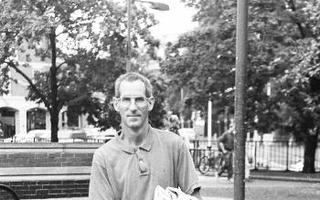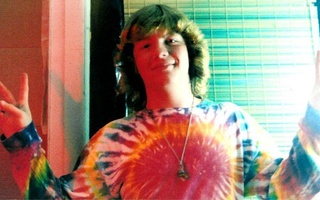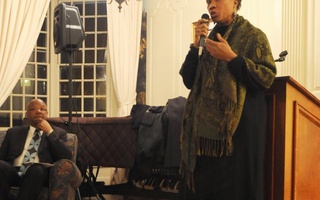IN 1960 RICHARD ALPERT was the son of the president of the New Haven Railroad. He was an ambitious Jewish intellectual who wore three-piece suits and glasses with black frames. He played the cello, flew airplanes, and dined out frequently. In the course of realizing his life-long wish to be a Harvard professor he had become one of the more ardent members of the behaviorist junta in the Department of Social Relations. The behaviorists were the tough-minded guys who wanted to apply impeccable scientific methodology to the study of psychology. No more intuitive cream cheese in the Soc Rel Department. Man is an organism, you know. There is nothing sacred about this particular animal . . . .
Alpert recently returned to Harvard for the first time since he and Leary were fired in 1963 for their experiments with psilocybin, a drug. The Graduate Student Colloquium in Soc Rel had invited him to give a talk. And those among the audience packing 2 Divinity Ave. who had beard him elsewhere could detect a certain strain as he began his delivery--a strange tenseness for one who had done this so many times before. Coming back to Harvard was a significant event for Alpert. Harvard is the symbol of his former life. Harvard people are the specters of his conscience. Their voice is the voice of his superego.
Nonetheless, the traces of anxiety ebbed away as he spoke. Alpert has changed his name to Baba Ram Dass, Hindi for "servant of God." He likes to recite a poem that begins, "I was born without parents. . . ." He says he is trying to fix his existence in a timeless state, and as he repeated his story at Harvard, the story he has told so often that it has become a spiel, a prayer, a mantra, the audience if not Alpert forgot about time. It was 7:30 when he began, and then 8:30, 9:30, 10:30, 11:30, 12:30, and finally everyone left, and at 1:00 there were only a few Harvard people clustered around the man in the white suit.
I
ALPERT TODAY is in transition, freaking out without drugs, a slow freakout that gets slower the nearer he gets to where he wants to be. That place of a thousand names is the same ex-stasis that a portion of the people who take LSD sometimes reach for short spans of time. Alpert wants to go on a permanent acid trip, but the methods he is using to get there are as alien to the style of his former cronies, the big guns of the psychedelic movement, as they are loony, dangerous, pathetic, insane to the authorities, to scientists, intellectuals, presidents of the United States, revolutionaries, cops, robbers, people in their right minds and Western society in general. Alpert now is an ascetic, fasting, abstaining from any kind of stimulant, from sex, from what we call "thinking" (??). He spends his time meditating, reading religious books, and disciplining his body through impossible Yoga exercises. It adds up--or subtracts down--to an existence that seems as far removed from the ethic of joy of the every second-is-your-birthday generation Alpert helped produce as the joymakers themselves are from the straight world. Alpert says he realizes that the friends who once knew the reason why he lived, the crowds who heard his psychedelic lectures and even the people who listen to his new story can only understand him from a distance. To them his existence doesn't seem like much fun. But Alpert waves a want of incense, bows his head in silence, and looks up with an insane grin on his face. "This is what fun's all about," he says.
The fun began in 1961 when Alpert turned on with psilocybin for the first time in Leary's house in Newton. Even as descriptions of first trips go, his is strange. And it happened before hardly anyone had heard of drugs. The high point came when he went by himself into a dark room and sat on a sofa to enjoy the silence. He saw an apparition several feet away in the gloom and leaned forward to discover himself dressed in academic robes. Richard Alpert the professor is not me, suddenly thought through his mind. The form dissolved and a new one took its place, himself with a cello. Richard Alpert the cellist is not me, his head said. The procession of identities continued, child, friend, lover, airplane pilot, thinker, rationalist, and Alpert surrendered himself to what was happening, discarding one self after another in his confidence that the stripping away would end with the disclosure of his core, him essential self. But the last apparition, the last revelation of the illusory nature of the faiths that had been sustaining his existence, was the essential core itself, plan Richard Alpert-ness. Terror seized him. Did he exist at all? At least he had his body. He looked down at his legs bud they had disappeared. Everything disappeared and he had no body, no self. He was pure energy.
Snow was falling when he walked home to his parents' house at three in the morning. He war full of peace. He took a snow shovel and began scraping the walk and singing. His parents came to the window and beckoned him to come in. "No," he waved. "It's a stone groove." When he thought of the lecture he would have to deliver Monday it hit him that his life would have to change. He thought of the Soc Rel Department. His theories, Freud, behaviorism, rationalism, psychology, science, what did they have to say about the state of his consciousness now? He thought of his colleagues, psychologists, students of the psyche. Did they know more about how to live, were they happier than professors of physics, professors of fine arts, professors of military science? Something stinketh.
So began Alpert's second life, a life that for all its flamboyance and notoriety unfolded as systematically as had his rise to professorship or his realization of the falsity of his first life. He and Leary began using psilocybin in a rehabilitation project with maximum-security convicts at Concord prison. In addition they administered maybe 3,500 doses of psilocybin to 400 volunteers in extra - University investigations. Although it involved only 35 inmates, the rehabilitation project was remarkably successful.
Twenty-two prisoners were released while Leary and Alpert still ran the project, and the rate of return was 32 per cent compared to a national average of 67 per cent. But the scientific laxity of the psychologists, the use of candles, mattresses and records in the drug sessions, and the outrageous statements Leary would make like, "In helping prisoners we have of course found that the prisoners have rehabilitated us--changed our notions about crime, punishment, . . . made us see the limitations of our middle-class conceptions, expanded our consciousness and given deeper meaning to our lives"--all this eventually became intolerable to their Harvard colleagues. Worst of all was the fact that researchers were taking the drug along with the prisoners.
Leary and Alpert were fired in the spring of 1963, the first firings in Harvard's history, despite their having agreed the previous fall to leave of their own accord after finishing out the year. The firings were handled disastrously. The University had a right to complain that Leary and Alpert's research techniques were exotic and possibly improper, and it had the right to expel them on that account. But the academic dispute over methodology was distorted by wild innuendoes initiated is some cases by the authorities themselves. Leary and Alpert were somehow responsible for black market rings selling acid-soaked sugar cubes in the Square for a dollar (acid for a dollar?).
Leary and Alpert were living in a commune. Leary was saying "the greatest psychotherapist in world history was the Buddha. . . " When they finally got the axe, Leary ostensibly for missing a meeting, Alpert for giving psilocybin to an undergraduate, the endlessly complicated issues involved were lost in sensational publicity. Leary and Alpert were stripped of all credibility and indelibly branded as trivial, irresponsible adventurers, when in actuality the least that could be said for them was that they were earnest and idealistic.
It is ironic and sad that Alpert and Leary should have been thrown defenselessly into one of the biggest games of all--the media game--just as they were beginning to explore their notions about games as the real nature of social structures. Once Harvard had disowned them they were prey to merciless and irresponsible excoriation by the press.
Until the press blitz Leary and Alpert had been using drugs more or less carefully for socially valuable scientific research. But with notoriety they were cut off from doing the work they really wanted to do and forced instead to defend drugs and themselves per se. They were trapped in a hopeless fight. Psychedelic drugs quickly became a public bogeyman on the order of "the Russians" or "masturbation." (Just a few weeks ago the Boston Globe printed an article citing claims that marijuana causes chromosome breakage, which is ridiculous to almost all of us now.) Leary and Alpert became identified with drugs. They didn't make the drug scene, they were the drug scene, by public fiat.
Thus the excesses that made Leary and Alpert such pariahs that no one but a commiefagpoet like Allen Ginsberg would associate with them were in part due to forces beyond their control. They couldn't throw these drugs they were onto in the dustbin, nor could they do anything but use them on themselves and other outcasts. It was a dead end. The more impassionate their defense of drugs, the more the public regarded them as dangerous maniacs.
Alpert himself sometimes felt like a maniac in the next five years. Here he was, a scientist who had fallen down the rabbit-hole and was wandering up and down the Western Hemisphere with a bunch of zanies who ate magic mushrooms. From Newton Leary's group moved to Zihuatenejo, Mexico, for an experiment in "transpersonative community living and the expansion of consciousness," but the neighbors didn't understand the jargon and the group was soon presented with man ultimatum to get out of the country in five days. Next they tried an uninhabited island in the Caribbean, but somehow they couldn't get in harmony with each other. The flow carried them back to the States and into the hands of a millionaire acidhead named Bill Hitchcock who gave them the mansion on his 4,000-acre estate in Millbrook New York.
Read more in News
New Starters Lead Nine To 7-4 Win Over M.I.T.Recommended Articles
-
Rising State at HBS Opts Out of Rat RaceAt the end of Mark S. Albion's '73 first year at Harvard, his father came to visit him while attending
-
 A Roller-Coaster Year for Dining Halls
A Roller-Coaster Year for Dining Halls -
Golan to Donors: ’Tis Better To Give for the Arts Than To ReceiveWhen milling around outside his Wigglesworth Hall entryway one spring afternoon in 1975, first-year Jay E. Golan ’78 caught a
-
 Harvard, LSD, and the 1960s
Harvard, LSD, and the 1960s -
 Former Mayor Simmons To Run for Senate
Former Mayor Simmons To Run for Senate -
Need Help with Your Schedule?The entire drug classification system is archaic, unscientific, and rather harmful.













